Probiotics are helpful for pigeons because they assist their bodies in handling germs that could otherwise lead to infections.
They’re particularly helpful for racing pigeons during the racing season as probiotics help them recover faster.
As an Amazon Associate, we earn a small fee from qualifying purchases made through Amazon links. This helps us run the site – thanks for your support!
If you’re looking for a suitable probiotic to give your pigeons something like this will do the job:

The Benefits Of Probiotics For Pigeons:
1. They’re great for maintaining your birds’ immunity
While probiotics cannot be used to cure infectious digestive diseases, especially severe ones, they will definitely prevent them.
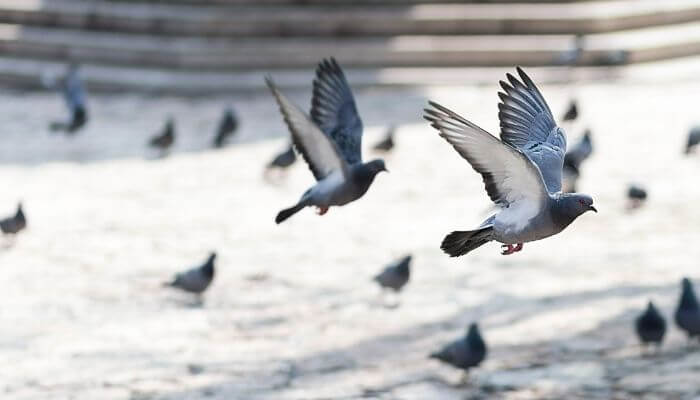
For one, if there are enough healthy bacteria in your pigeons’ gut, there will not be enough room for pathogenic bacteria to develop.
Secondly, the intestine is where most food gets digested, so in the presence of enough probiotics, the pigeons’ bodies will extract the nutrients from the food you give them adequately.
2. They support pigeons in periods of stress
Probiotics are great to give to racing pigeons, especially before competitions.
They are just as beneficial after these races have taken place because they allow the birds to recover quickly.
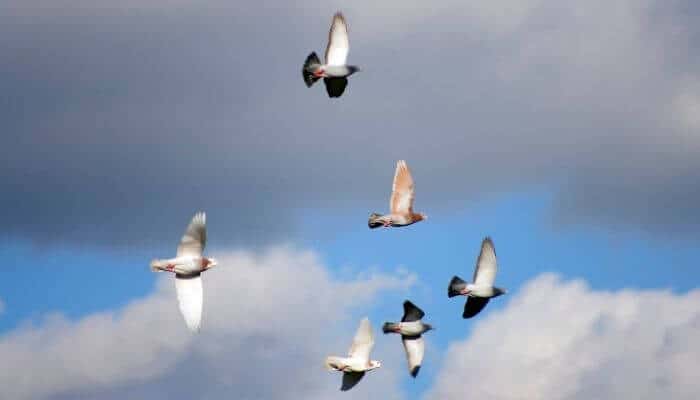
They can also prevent disease when racing pigeons are transported in highly populated carrier boxes to and from the competitions.
3. They make pigeons less likely to pluck their feathers
Because pigeons that are given probiotics are basically experiencing better digestion and, therefore, better absorption of nutrients into their blood flow, they are getting all the minerals and vitamins from these sources.
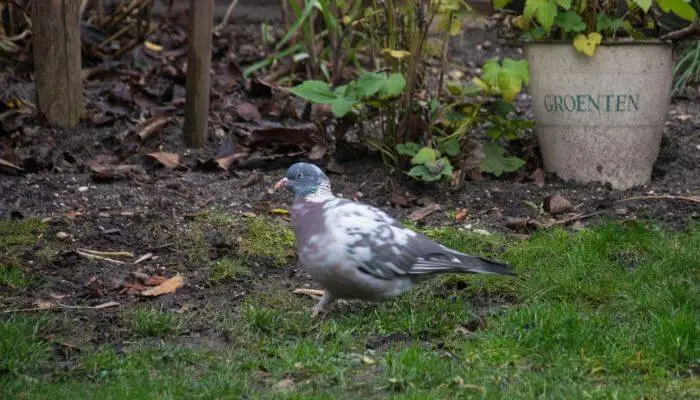
Therefore, they are less likely to develop pica, a syndrome that happens when they are stressed but also when they’re not absorbing the proper nutrients from their feeds.
4. They stimulate your pigeons’ appetite
Because the Lactobacillus species (found in probiotics) are capable of producing enzymes, along with B vitamins, they will influence your pigeons’ appetite.
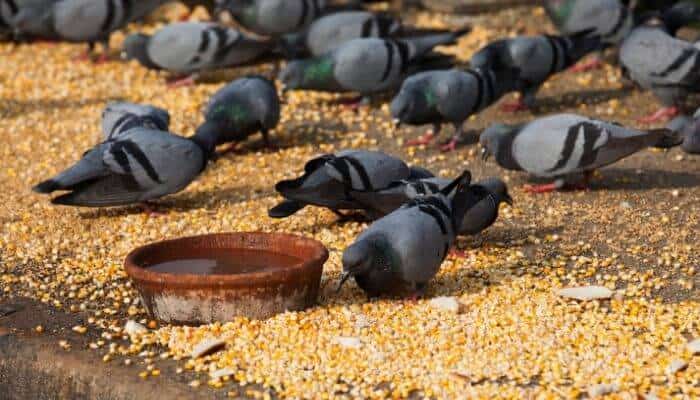
This can be a very good outcome for birds that might have lost their appetite as a result of them being sick.
5. They help your birds recover from disease faster
If you happen to put your birds on a treatment of antibiotics, giving them B vitamins along with probiotics can do them a world of good.
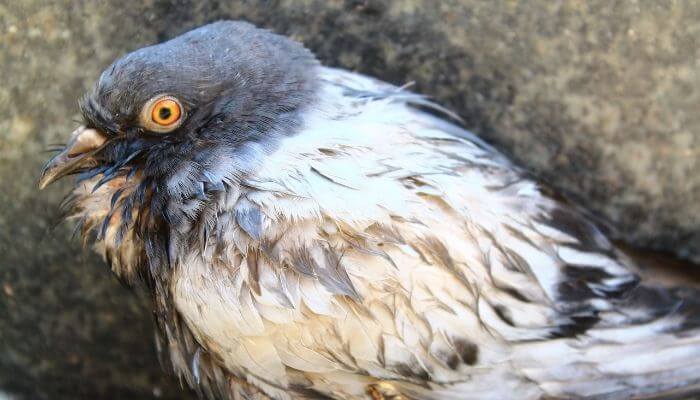
Antibiotics will not only kill the pathogenic bacteria that might have caused the health issue, but they will also lower the population of probiotics that the birds naturally have in their gut.
Therefore, your pigeons might end up suffering from Candidiasis, a condition produced by a fungus that can take advantage of this situation.

This article was written by our qualified veterinarian Cristina.
This is part of our commitment to providing you with the most trustworthy veterinary advice for your pigeons.
What Is The Best Probiotic For Pigeons?
A clear answer to this question doesn’t exist, and that’s because it also depends on your specific needs.
If you want to use a probiotic powder instead of giving your birds tablets one by one, that could be convenient but also somewhat unsafe.

You have no control over how much probiotic product every pigeon consumes in this case.
And while no pigeon is going to get sick from you administering them too much of the product, other birds might not get the opportunity to eat any.
Whenever your pigeons are sick, we recommend giving them tablets once or twice a day.
Every product has different instructions, so to prevent infections, you might need to give your birds just one to three tablets per week.
To help your pigeons cope with common diseases, you will need to increase the dose and give them a daily amount.
How Do Probiotics Work?
Probiotics, whether you make them on your own or purchase them from the pet store or online, are actual living organisms.
More often than not, you will see that the label of any probiotic for pigeons you’ve invested in comes with a precise number of ‘million’ per tablet, spoon, or ml.
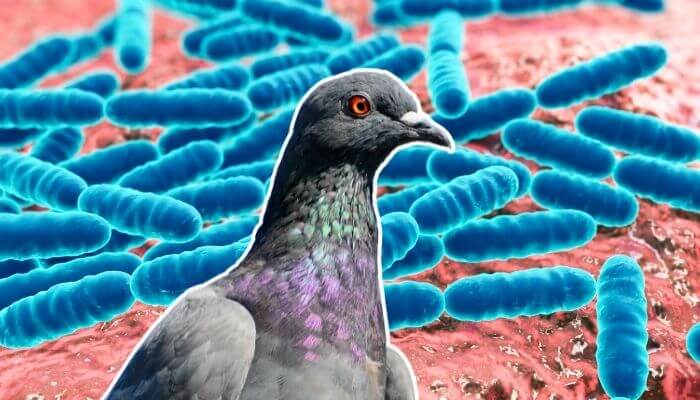
Moreover, the product will also specify exactly what types of probiotics are present in the mix.
Lactobacillus species come in various shapes and sizes, and they also tend to vary depending on every animal or bird in part.
When you are giving your birds probiotics, you’re basically supporting the microbiota that is already present in your pigeons’ gut.
The reason these microorganisms have to be there is that in their absence, there could be other pathogenic bacteria growing to dangerous levels in your pigeon’s intestines.
E. coli is an excellent example of a bacterium that can be found in your birds’ droppings at any time, whether they are healthy or not.
But when you give your pigeons antibiotics or something in their diet causes them to experience a decrease in their Lactobacillus population, that means that E. coli now has the opportunity to reproduce and cause an infection.
Probiotics also make it possible for your pigeons’ digestion to happen correctly.
With their activity and features, they protect the mucous membrane that can be found on the lining of the birds’ intestines.
This is a critical role they play.
When this lining gets hurt, your pigeons could develop hemorrhagic diarrhea, and dangerous germs can end up in their blood circulation.
They also contribute to the production of the mucus that is necessary for your birds to have regular droppings and, therefore, eliminate any toxins or potentially dangerous bacteria from their bodies.
Do All Pigeons Need Probiotics?
It wouldn’t be wrong to assume that all pigeons that are kept as pets or for racing need to be given probiotics on a regular basis.
Because these microorganisms make it harder for the birds to develop health conditions, particularly under immense stress, they are highly recommended for racing pigeons.
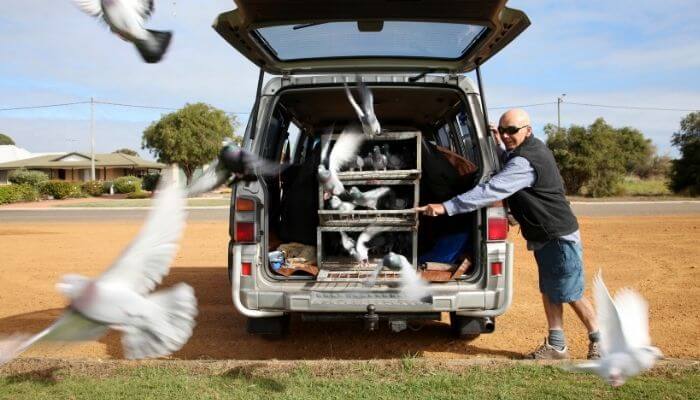
However, you shouldn’t think that starting a probiotic treatment one or even two days before the competition is going to have any positive effect.
Because they are not drugs per se, these products need time to work.
If a race is approaching, you should start giving your pigeons probiotics at least two weeks in advance.
If you keep pigeons for any other purpose than racing, you can still give them probiotics to prevent them from getting sick.
So yes, probiotics are beneficial for all pigeons.
How To Make DIY Probiotics For Racing Pigeons
There is no scientific evidence as to whether or not homemade probiotics provide the same benefits for pigeons as their ‘artificial’ counterparts.
And the reason for this is that when you ferment food like cabbage or even yogurt at home, you have no specific control over how large the population of Lactobacillus in those products is.
Pigeons might also be less partial to sauerkraut or drinking yogurt on their own, so you will have to give them these foods individually.
You can ferment pigeon grain using the steps below:
- Place it in a clean container
- Add enough water until the grain is completely covered
- Add whey if you want a quicker fermentation process
- Cover the container or jar with a cloth
- Leave it at room temperature for three to four days
- Mix the grains every day to stimulate fermentation and prevent mold
- Give the feed to your pigeons when the grains start smelling like sourdough
These days, there are fermenting kits that you can purchase from online retailers.
These products let you have some control over the fermentation process so that you know when the grains are ready to give to your pigeons without basing your decision on instinct.
Final thoughts
To conclude, probiotics can be beneficial for any type of pigeons, whether they are kept for racing or as pets.
For more information on the types of probiotics that you can give your pigeons depending on their health and other factors, be sure to contact your avian veterinarian.
Resources:
- Changes in the diversity and composition of gut microbiota in pigeon squabs infected with Trichomonas gallinae, Feng Ji et al, Scientific Reports, 2020
- Modulatory effects of probiotics during pathogenic infections with emphasis on immune regulation, Abdul Raheem et al, Frontiers Immunology, 2021
- Health status and stress in different categories of racing pigeons, Marjan Kastelic et al, Animals MDPI Basel, 2021
